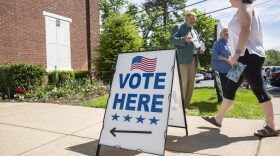Beginning this week, Pennsylvania state police and several other state and local agencies have the authority to forcibly shut down businesses that violate Gov. Tom Wolf’s coronavirus prevention orders.
But, officials say, they’re trying hard not to use it.
“State police … realize this is a tough time for business owners. There’s a lot of information related to COVID-19 that comes out every day, and honestly there’s a lot of misinformation out there,” Pennsylvania State Police spokesman Ryan Tarkowski said. “Nobody is looking to get anybody unnecessarily involved in the legal system.”
The governor’s order directs all “non-life-sustaining” businesses to pause their operations until further notice and has resulted in a patchwork of open storefronts in Pennsylvania’s towns and cities. Grocery, building material and general merchandise stores can stay open, but most other retail stores cannot. Beer distributors are operating, but state-run wine and liquor stores aren’t. Farmers, miners, fishers and loggers are at work, but nearly all construction is halted.
The list is also evolving. For instance, after an initial decision to shut down laundromats was criticized by city-dwellers without personal washing machines, the businesses were moved to the “life-sustaining” list.
Tarkowski said PSP has found most businesses are eager to comply, but noted that the quickly evolving situation has led to some confusion among business owners, as well as mixed perceptions of how strict the orders actually are.
“Every time the governor puts out an order, our phones start to ring and the first question is, ‘Well what if we don’t? Or what if somebody disobeys? What is the penalty?’” said Tarkowski.
Since the order took effect Monday morning, state police have been tracking how many business owners they’ve confronted about inappropriately continuing operations. In the first two days, they logged 44 warnings among their fifteen troops. The highest number, nine, came from Troop A, which covers Somerset, Indiana, Westmoreland and Cambria Counties.
Municipal police and local officials, the state Health and Agriculture departments, and the Liquor Control Board all have authority to enforce closures as well, so it’s likely that the state police’s warnings are not the only ones that have been issued.
That enforcement power is primarily backed up by two state statutes: a portion of the Administrative Code of 1929, and part of the 1955 Disease Prevention and Control Law.
The former says violators must go in front of “a justice of the peace, alderman, or magistrate of the county” and could be fined between $10 and $50 “and costs.” The latter says violators shall, upon conviction, be given a fine between $25 and $300 “together with costs” and if payment isn’t made, they can be imprisoned in county jail for up to 30 days.
Tarkowski noted, the fines laid out in those decades-old statutes are merely a baseline — with additional costs added, they could end up being much steeper, especially if business owners don’t comply after they are given warnings and formal citations.
“Eventually, we can get a court order to shut you down, and then you’re going to run into business licensing issues,” he said. “I wouldn’t suggest anybody disregard the order and say, ‘Oh, I’ll just pay the fine,’ because it’ll get worse.”
According to Pennsylvania State Police, business closures are the only coronavirus-related orders that carry enforcement mechanisms.
Stay-at-home orders, which as of Wednesday night will cover Lehigh, Allegheny, Bucks, Chester, Delaware, Erie, Lehigh, Monroe, Montgomery, Northampton and Philadelphia counties, don’t technically carry penalties. Though Tarkowski noted, that doesn’t mean people who ignore it won’t be informally admonished.
If police officers “see a volleyball game going on in the park, they’re probably going to head over and say, ‘Hey guys, you’re under an order to stay at home,’” he said.
Like the police, Gov. Tom Wolf and other state officials have been circumspect about business closure enforcement.
“Ultimately, this depends on the people and businesses of Pennsylvania to make the right decision,” Wolf said in a Tuesday press conference. “If we don’t follow this, if we allow people to congregate, if we don’t stay at home, we’re putting other people in danger.”
County officials appear to be on the same page. Marian Moskowitz, who chairs the Chester County Board of Commissioners, said “this isn’t the time” for aggressive discipline.
And so far, she added, “we have not had a situation like that. Everybody has been stepping up to the plate.”







